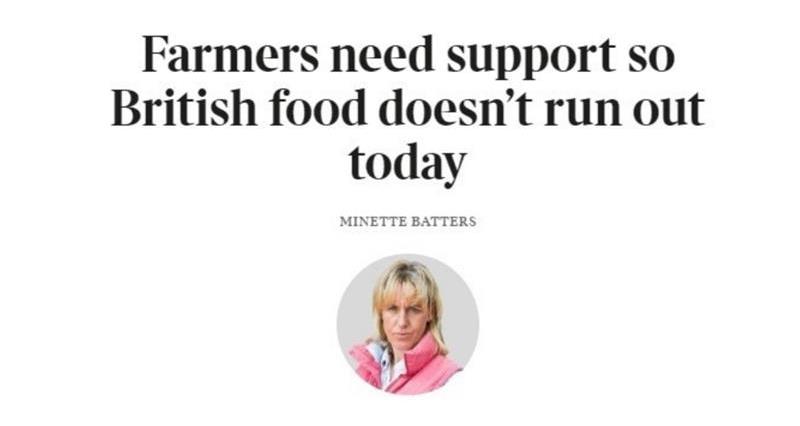Today is an important day if, like me, you love great British food. Whether it’s West country beef, Welsh lamb, Cumbrian sausages or Wensleydale cheese, today is the notional day when if we fed everyone in the UK with the food produced here from January 1 2019 it would run out. Yes, that’s right, run out.
New figures put the UK’s self-sufficiency in home-grown food at 61%. That figure provides us with a helpful yardstick to measure our ability to feed ourselves while remaining a great trading nation. It’s seen a downward trend for a number of years. From the highs of 75% in the 1980s to 61% today.
So, today we are calling for a clear pledge from government that it will not let our current self-sufficiency levels fall below 61%. Our self-sufficiency has declined over recent years and our political leaders need to hear this wake-up call. While we will never be completely self-sufficient as a country it is vital that Britain takes its role as a food producer for its growing population seriously and does not rely on the rest of the world – with wildly varying standards of production – to feed our population which is likely to grow to 73 million people in 20 years’ time.
It's an issue that should concern anyone who values British food and the farms on which it is produced. It should concern anyone who cherishes our stunning countryside and iconic landscapes which bring in visiting tourists in their millions. And it should concern anyone who values our world-leading standards of animal welfare.
Not only do our fantastic farmers and growers produce safe, traceable and affordable food for everyone, but they deliver so much more. When people buy British food they are buying into standards that protect and enhance our natural resources. They are buying into world-leading standards of animal welfare, and they are buying into the role farmers are playing in combatting the climate change challenge that is facing us all.
We are in the spotlight like never before. We know the farming industry will be most affected by Brexit and we face an array of possible outcomes. My concerns lie in how we leave the EU on October 31. For me, it’s vital that any Brexit is orderly and that politicians do all they can to retain our food production values and safeguard our domestic food supply.
Ambitious trade deals must be sought but we repeat that these must not let cheap food imports, produced to standards that would be illegal here, into this country. It will decimate farming’s ability to serve the nation and could destroy the public’s trust in the food on our supermarket shelves.
For our part, British farming is entering a new era. We have set ambition plans to be net zero by 2040 and with the right food and farming polices in place I believe we have the right roadmap to deliver. We are ready and able to drive productivity while using less inputs and in smarter ways too, we are ready and able to plant bigger hedgerows, more woodland and secure more carbon rich soils, and we are ready and able to contribute more to renewable energy combined with carbon capture and storage in our grasslands used for grazing.
As well as asking for that clear pledge from government, we are also calling for full British procurement so our schools, hospitals, hotels and restaurants can all source British assured ingredients wherever possible.
British farming is the backbone of the country’s largest manufacturing industry; food and drink. It contributes more than £120 billion to the UK economy and employs almost four million people – one in seven of us work within the industry.
In the next few weeks we will have a once-in-a-generation opportunity to shape our future food and farming policy. Decisions made today will be instrumental in the future we build and the legacy we leave behind. I hope today acts a wake-up call for all those in power to look at what can be gained and also what is at stake.
